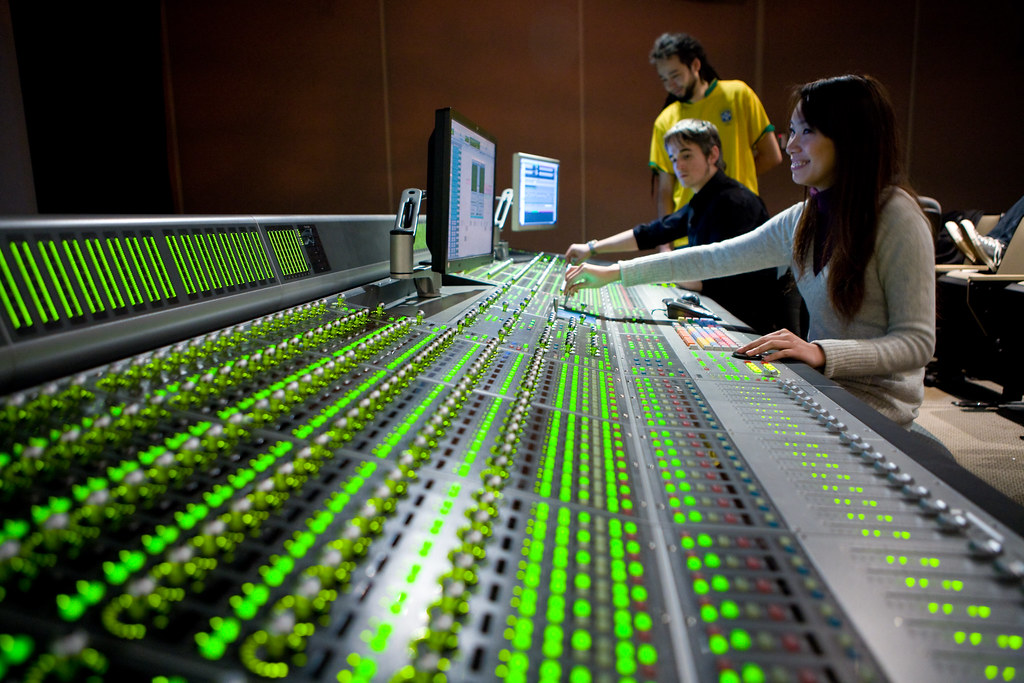Are you passionate about music production and dreaming of turning it into a career? Starting a career in music production can be a daunting task, but it doesn’t have to be. In this comprehensive guide, we’ll walk you through the essential steps on how to start a career in music production. Whether you’re just starting or have some experience in the field, this guide is designed to give you practical tips and insider advice to help you achieve your career goals. So, let’s dive in and explore what it takes to become a successful music producer.
Table of Contents

Introduction
Music production is the process of creating, recording, and editing music. It involves working with various professionals, such as artists, songwriters, and audio engineers, to create high-quality recordings that can be played on the radio, streamed online, or sold in stores. The music industry is a multibillion-dollar industry that provides a wide range of career opportunities, and music production is an integral part of this industry. It offers various job opportunities, such as working for music production companies, recording studios, or freelancing.
In this article, you will learn 10 essential steps to start a career in music production. By following these steps, you will be able to develop your skills, gain relevant experience, get the proper education and training, and build a professional network needed to succeed in this exciting and dynamic field. Whether you are a beginner or an experienced musician, this guide will provide you with the necessary tools to start your career in music production.
Steps to Starting a Career in Music Production

A. Develop Essential Skills
To start a career in music production, you need to develop some essential skills. These skills will enable you to create high-quality recordings that meet industry standards. Here are some of the essential skills you need to develop:
1. Mastering Music Production Software
Music production software is the backbone of the music production process. To become a successful music producer, you need to master the software that is used in the industry. Some of the most popular music production software includes:
- Ableton Live – A digital audio workstation (DAW) that is used for music production, live performance, and DJing.
- Pro Tools – A DAW that is used for recording, editing, and mixing music.
- Logic Pro X – A DAW that is used for music production, mixing, and mastering.
2. Understanding Audio Engineering Principles
Audio engineering is the science of recording, mixing, and mastering sound. To become a successful music producer, you need to understand the principles of audio engineering. Some of the principles you need to understand include:
- Signal Flow – The path that audio signals take from the microphone to the final mix.
- Equalization – The process of adjusting the frequency balance of a recording.
- Compression – The process of reducing the dynamic range of a recording.
3. Learning Music Theory
Music theory is the study of the elements of music, including melody, harmony, rhythm, and form. To become a successful music producer, you need to have a solid understanding of music theory. Some of the areas of music theory you need to learn include:
- Chords and Chord Progressions – The building blocks of music.
- Melody and Harmony – The main elements of a song.
- Rhythm and Timing – The elements that give music its groove.

B. Gain Relevant Experience
In addition to developing essential skills, you also need to gain relevant experience. This experience will enable you to hone your skills and build a portfolio of work that you can use to showcase your abilities to potential employers. Here are some ways you can gain relevant experience:
1. Building a Home Studio
Building a home studio is a great way to gain experience in music production. You can start with a basic setup that includes a computer, a DAW, and a microphone. As you gain more experience, you can add more equipment to your setup.
2. Collaborating with Other Artists
Collaborating with other artists is a great way to gain experience in music production. You can work with singers, songwriters, and other musicians to create high-quality recordings.
3. Creating a Portfolio of Work
Creating a portfolio of work is essential if you want to showcase your abilities to potential employers. Your portfolio should include recordings that demonstrate your skills as a music producer.

C. Education and Training
Education and training are essential if you want to start a career in music production. Here are some ways you can get the education and training you need:
1. Enrolling in Music Production Courses or Degree Programs
Enrolling in music production courses or degree programs is a great way to get the education and training you need. Many colleges and universities offer music production programs that cover the essential skills and knowledge you need to succeed in the industry.
2. Attending Music Production Workshops and Seminars
Attending music production workshops and seminars is a great way to get hands-on training in music production. These events are often led by industry professionals who can provide you with valuable insights and advice.
3. Gaining Certifications in Relevant Areas
Gaining certifications in relevant areas is a great way to demonstrate your expertise to potential employers. Some of the certifications you can get include:
- Avid Certified User for Pro Tools – A certification that demonstrates your proficiency in using Pro Tools.
- Ableton Certified Trainer – A certification that demonstrates your expertise in using Ableton Live.

D. Building a Professional Network
Building a professional network is essential if you want to start a career in music production. Here are some ways you can build your network:
1. Attending Industry Events and Conferences
Attending industry events and conferences is a great way to meet other music industry professionals. You can network with other music producers, recording engineers, and other industry professionals.
2. Reaching Out to Established Professionals for Advice and Guidance
Reaching out to established professionals for advice and guidance is a great way to build your network. You can ask for advice on how to get started in the industry and how to advance your career.
3. Joining Relevant Industry Associations and Groups
Joining relevant industry associations and groups is a great way to connect with other music industry professionals. Some of the associations and groups you can join include:
- The Recording Academy – An association that represents the music recording industry.
- The Audio Engineering Society – An association that promotes the science and practice of audio engineering.

Finding Music Production Jobs
After developing essential skills, gaining relevant experience, receiving education and training, and building your professional network, it’s time to start looking for music production jobs. Here are some tips to help you find the right job:
A. Job Opportunities in Music Production
The music production industry is vast and offers many job opportunities. Here are some of the most common job opportunities available:
1. Music Production Companies
Music production companies provide music production services to artists, record labels, and other clients. They often hire music producers, recording engineers, and other music industry professionals. If you are looking to work with big names in the industry, music production companies are an excellent place to start.
2. Recording Studios
Recording studios are facilities designed for recording, mixing, and mastering music. They often hire music producers, recording engineers, and other music industry professionals. Working in a recording studio will expose you to the latest recording equipment and techniques.
3. Freelance Opportunities
Freelance opportunities are available for music producers who prefer to work independently. You can find freelance opportunities on websites like Upwork and Freelancer. Freelancing gives you the flexibility to choose your projects and work on your own terms.
B. Building a Strong Resume and Portfolio
Building a strong resume and portfolio is essential to increase your chances of landing a music production job. Here are some tips to help you build a strong resume and portfolio:
1. Highlight Relevant Skills and Experience
Your resume should highlight your relevant skills and experience. Include information about your education, training, and work experience. Focus on the skills that are most relevant to the job you are applying for.
2. Showcase Previous Work
Your portfolio should include recordings that demonstrate your skills as a music producer. Include recordings that showcase your ability to produce high-quality recordings. You can also include any collaborations with other artists and bands.
C. Preparing for Interviews
Preparing for interviews is essential if you want to land a music production job. Here are some tips to help you prepare for interviews:
1. Research Potential Employers
Before the interview, research the potential employer. Learn about their business, clients, and services. It will help you tailor your responses to their needs.
2. Prepare Questions to Ask
During the interview, be prepared to ask questions. Ask about the job, the company, and the music industry. Asking questions shows that you are interested and engaged.
3. Practice Interview Techniques
Practice your interview techniques before the interview. Practice answering common interview questions and presenting yourself in a professional manner. It will help you feel more confident during the interview.

Navigating the Music Production Industry
Navigating the music production industry can be challenging, but it’s essential if you want to succeed in this field. Here are some tips to help you navigate the music production industry:
A. Understanding Music Industry Trends
Understanding music industry trends is crucial if you want to stay relevant in the music production industry. Here are some trends you should be aware of:
- Staying up-to-date with new technology and equipment – The music production industry is constantly evolving, with new technology and equipment being developed frequently. Staying up-to-date with these developments is essential to stay ahead of the competition. Additionally, this will help you leverage the latest tools and technologies to deliver high-quality work to your clients.
- Being aware of shifts in popular music genres – Popular music genres are always changing, and you should be aware of these shifts. This awareness will enable you to adapt your skills and services to meet the demands of the industry. For instance, if you notice a trend towards retro music, it would be wise to incorporate retro sounds and techniques into your productions.
B. Marketing and Promoting Your Services
Marketing and promoting your services is essential if you want to make a name for yourself in the music production industry. Here are some tips to help you market and promote your services:
1. Creating a Strong Brand Identity
Your brand identity should reflect your skills, experience, and personality. Creating a brand identity that stands out from the competition is the first step to getting noticed in the industry. To create a strong brand identity, consider factors like your unique selling proposition (USP), target audience, and personal style.
2. Building an Online Presence
Building an online presence is crucial in today’s digital age. Your website and social media profiles are your digital storefront, and they should showcase your skills and experience. It’s essential to make sure that your online presence is updated frequently with your latest work, and that it’s optimized for search engines.
3. Networking with Other Industry Professionals
Networking with other industry professionals is essential if you want to build your client base and learn about new opportunities. Attending industry events, joining online groups, and collaborating with other music industry professionals can help you build relationships and expand your network. Additionally, this can help you learn about new trends, technologies, and best practices, as well as find new clients and job opportunities.
Common Questions About Starting a Career in Music Production
As you embark on your journey to start a career in music production, you are likely to have some questions. Below are some common questions and their answers:
A. What is the average salary for music producers?
The average salary for music producers varies depending on factors such as location, experience, and job type. According to Payscale, music producers in the United States earn an average salary of $51,000 per year, with some earning as little as $26,000 and others earning as much as $115,000, depending on their level of experience and expertise.
B. What equipment do I need to start producing music?
The equipment needed to start producing music includes a computer, a Digital Audio Workstation (DAW), and a microphone. A DAW is a software application used for recording, editing, and producing audio files. Some popular DAWs include Ableton Live, Logic Pro, and Pro Tools. As you gain more experience, you may want to invest in additional equipment such as a MIDI keyboard, studio monitors, and audio interface.
C. How do I get my music heard by industry professionals?
To get your music heard by industry professionals, you need to build a strong portfolio of work and network with other music industry professionals. You can also submit your music to music blogs, record labels, and other industry professionals. It is important to have a professional-looking website and social media presence, as this can help you gain exposure and build credibility in the industry.
D. What are the biggest challenges facing music producers today?
One of the biggest challenges facing music producers today is competition. With so many aspiring music producers entering the industry, it can be difficult to stand out and get noticed. Another challenge is keeping up with changing technology and industry trends. As technology evolves, music producers need to stay up-to-date with new software, hardware, and production techniques. Finally, shifts in popular music genres can also pose a challenge, as producers need to be able to adapt to these changes in order to remain relevant and successful.
E. What qualities do successful music producers have in common?
Successful music producers share several key qualities. First and foremost, they have a passion for music and a deep understanding of the creative process. They also have strong attention to detail and are able to work effectively under pressure. Additionally, successful music producers have excellent communication skills, as they need to be able to collaborate effectively with artists, engineers, and other industry professionals. Finally, they have the ability to adapt to changing technology and industry trends, and are always looking for ways to innovate and improve their craft.

Tips for Building a Successful Career in Music Production
Building a successful career in music production takes hard work, dedication, and perseverance. Here are some insider tips to help you build a successful career in music production:
A. Setting Goals and Defining Success
To build a successful career in music production, you need to set specific goals that are achievable and measurable. Identify your personal goals and aspirations and determine what success looks like to you. Here are some practical tips to help you set and achieve your goals:
- Create a timeline: Break down your goals into smaller, achievable steps and create a timeline for each step.
- Track your progress: Use a journal or a spreadsheet to track your progress and celebrate your successes.
B. Staying Motivated and Focused
Staying motivated and focused is essential if you want to succeed in the music production industry. Here are some practical tips to help you stay motivated and overcome obstacles:
- Find inspiration: Listen to different types of music, attend live shows, and collaborate with other artists to stay inspired.
- Stay organized: Use a calendar and to-do list to stay organized and focused on your goals.
- Take breaks: Take breaks from your work to avoid burnout and come back with a fresh perspective.
C. Continuing Education and Professional Development
Continuing education and professional development are essential if you want to stay ahead of the competition. Here are some practical tips to help you stay up-to-date with new techniques and technologies:
- Attend industry events: Attend workshops, seminars, and conferences to learn about new trends and techniques in the industry.
- Seek mentorship: Find a mentor who can provide guidance and support as you navigate your career in music production.
- Learn new skills: Take courses or watch online tutorials to learn new skills and techniques.
D. Balancing Creativity and Business
Balancing creativity and business is essential if you want to succeed in the music production industry. Here are some practical tips to help you maintain artistic integrity while meeting client demands:
- Understand the client’s needs: Communicate with clients to understand their needs and expectations for the project.
- Set boundaries: Set clear boundaries and expectations with clients to maintain your artistic integrity.
- Stay organized: Use project management tools to stay organized and meet deadlines.
- Collaborate with other professionals: Work with other professionals, such as audio engineers and session musicians, to bring your creative vision to life.
Conclusion
In conclusion, starting a career in music production can be a fulfilling and exciting journey, but it requires dedication and hard work. By following the 10 essential steps outlined in this article, you’ll be well on your way to achieving your career goals. Remember to develop essential skills such as mastering music production software, understanding audio engineering principles, and learning music theory. Additionally, gaining relevant experience through building a home studio, collaborating with other artists, and creating a portfolio of work can give you a competitive edge in the industry.
Education and training through music production courses, workshops, seminars, and certifications can also help you stay up-to-date with the latest industry trends and techniques. Building a professional network by attending industry events and conferences, reaching out to established professionals, and joining relevant industry associations and groups can also help you establish yourself in the industry. Finally, navigating the music production industry by understanding trends and marketing your services can help you succeed in a competitive industry.
We hope that this article has been helpful in providing you with the information you need to start a career in music production. If you’re interested in learning more about this exciting field, be sure to check out our other content on music production software, digital audio workstations, studio monitors, MIDI controllers, and audio interfaces. Good luck on your journey towards a successful career in music production!


